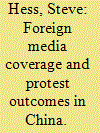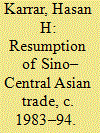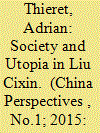| Srl | Item |
| 1 |
ID:
139669


|
|
|
|
|
| Summary/Abstract |
By looking at the case of the 2011 Wukan rebellion in Guangdong Province, the following article explores the role played by foreign media in influencing the protest’s ultimate outcome: an intervention from above by provincial authorities in favour of the villagers. Placing Wukan into a four-level model incorporating local, provincial, national, and international dimensions, this article considers howWukan might serve as a model for contention that may influence future acts of popular protest in China in the digital age. It suggests that while appealing directly to foreign media can help claimants increase their leverage over local officials and prompt interventions from above, such actions are likely to modify and accelerate, but not fundamentally transform, existing patterns of localized, community-specific acts of contention seen earlier in the Reform Era.
|
|
|
|
|
|
|
|
|
|
|
|
|
|
|
|
| 2 |
ID:
147192


|
|
|
|
|
| Summary/Abstract |
The resumption of trade across the Sino–Central Asian border in 1983 accompanied a gradual thaw in relations between China and the Soviet Union. This paper argues that: (1) Economic liberalization in China (alongside the Soviet Union) created a climate encouraging cross-border exchange. (2) Starting in 1983, improving relations between China and the Soviet Union permitted cross-border exchange in Central Asia; over the subsequent decade, trade volume served as a marker of bilateral relations. (3) Beginning in 1990, efforts by the Chinese leadership to accelerate reform in North-West China, coupled with the independence of Central Asian republics, led to a rapid increase in trade. Hence, the resumption of Sino–Central Asian trade was not grounded in meta-geographical projections – Silk Road, New Silk Road, Silk Road Economic Belt, Eurasian Continental Bridge – but determined by political and economic transitions in the two countries, accompanied by normalizing bilateral relations.
|
|
|
|
|
|
|
|
|
|
|
|
|
|
|
|
| 3 |
ID:
138593


|
|
|
|
|
| Summary/Abstract |
This article examines utopianism in contemporary China through the short stories “Taking Care of God” and “Taking Care of Humans” by best-selling science fiction author Liu Cixin. It argues that these stories constitute an ethical resistance to the shortcomings of the capitalist world order into which China has merged during the reform period. Read as a continuation of the modern Chinese utopian tradition as well as a reaction to contemporary trends, these stories offer an articulation of hope that a more just social order can yet be achieved despite the seemingly intractable problems facing the world today.
|
|
|
|
|
|
|
|
|
|
|
|
|
|
|
|